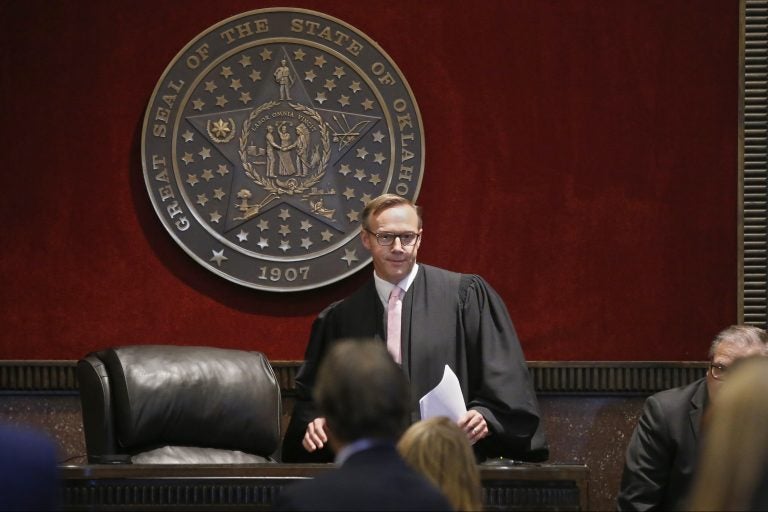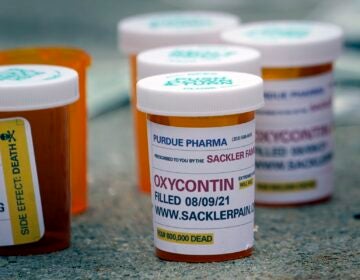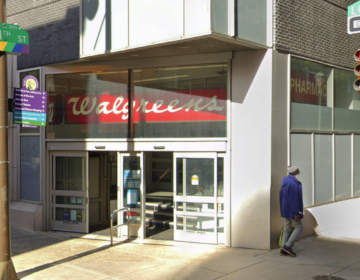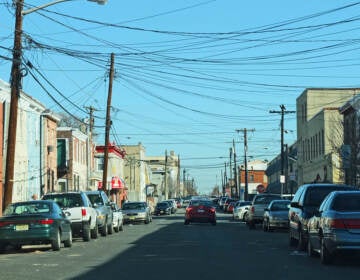Pa. counties encouraged by landmark J&J opioid decision in Oklahoma
Local attorneys hope the landmark Oklahoma decision against the powerhouse drug manufacturer will set a precedent for similar cases in Pennsylvania.

Judge Thad Balkman arrives to give his decision in the Opioid Lawsuit in Norman, Okla., Monday, Aug. 26, 2019. Balkman found Johnson & Johnson and its subsidiaries helped fuel the state's opioid drug crisis and ordered the consumer products giant to pay $572 million to help abate the problem in the coming years. (AP Photo/Sue Ogrocki, Pool)
All summer, attorneys and local governments across the country watched the 33-day-long trial pitting the state of Oklahoma against pharmaceutical powerhouse Johnson & Johnson closely, to see how it might pave the way for similar cases.
On Monday, the Oklahoma judge ruled that the drug manufacturer and its distributor subsidiary must pay the state more than half a billion dollars in damages for deceptive marketing of painkillers.
That decision was largely viewed as good news Tuesday in Pennsylvania.
In Delaware County, a group of four cases will serve as a bellwether lawsuit for the local governments that have filed in Common Pleas Court there. The suits encompass Delaware County, which was the first in the state to file; the Philadelphia District Attorney’s Office; the Philadelphia Carpenters Union, whose insurance plans paid for both prescriptions and treatment programs; and Carbon County. Attorneys in these cases make the same claim that was made in Oklahoma: that the harm caused by drugmakers constitutes a public nuisance.
Carmen Belefonte, of the law firm Saltz, Mongeluzzi, Barrett and Bendesky, is representing Delaware County in its suit against Purdue, Teva, Endo and Janssen pharmaceutical companies. Encouraged by Monday’s ruling, Beleftonte said the clearest message the Oklahoma judge sent was that the relationship between the drug sales and the current crisis is linked — and that the drugmakers are liable.
“The judge said the increase in opioid addiction and overdose deaths following the parallel increase in opioid sales was not a coincidence,” said Belefonte. “He made a causal connection.”
The lawyers in Delaware County are requesting a jury for their trial. It would be up to the jurors to decide whether the defendants in Pennsylvania created a public nuisance. No trial date has been set.
Chester County sued Endo and Cephalon in April in federal court in Philadelphia, a case that has been transferred to become a part of a multi-district litigation being heard in the Northern District of Ohio. There, too, local officials are encouraged.
“The decision in Oklahoma clearly shows that [pharmaceutical companies] were directly responsible for those victims, and I think that legal analogy is certainly transferable to the rest of the country,” said Michelle Kichline, who chairs the Chester County Board of Commissioners. The county’s lawsuit is one of more than 2,000 from across the country — the first batch of them will be heard by a federal judge in Cleveland in October.
Even though the judge in Oklahoma demanded that Johnson & Johnson pay only a fraction of the $17 billion the state’s attorneys claimed in damages, Kichline is hopeful that it will set the precedent for big companies to be on the hook to help local governments foot the bill for addiction treatment caused by the opioid epidemic.
“We do need funding to continue to sustain the programs and services and all the resources that the counties provide for our citizens that are impacted by this,” she said. “The pharmaceutical manufacturers and distributors have to share a portion of that burden.”
The Oklahoma ruling could prompt more pharmaceutical companies to settle. In March, Purdue Pharma and the Sackler family that owns it settled a case with that state for $270 million. The company settled with Kentucky in 2015 for $24 million. Both are substantially smaller amounts than the $572 million ruling in court against Johnson & Johnson, but legal scholars say smaller entities should not be discouraged by the smaller payout, either.
“While the amount awarded was far less than Oklahoma requested, this should actually encourage other plaintiffs,” wrote Nina Kohn, the David M. Levy professor of law and associate dean for online education at Syracuse University’s College of Law. “It means that even if the Oklahoma judgment is upheld after appeal, there will be a lot more money left in the Johnson & Johnson piggy bank to pay other states and cities.”
The states of Delaware, New Jersey and Pennsylvania have all filed separate suits against opioid manufacturers.
Lawyers for Johnson & Johnson have said they plan to appeal Monday’s decision in Oklahoma.
WHYY is your source for fact-based, in-depth journalism and information. As a nonprofit organization, we rely on financial support from readers like you. Please give today.





